|
Lambert Climent
He works frequently with ensembles specializing in European renaissance and baroque music such as Camerata Iberia, Sacqueboutiers de Toulouse, La Romanesca, Grupo Speculum, Xácara, the Chamber Choir of the Centre of Ancient Music in Pádova, Capella de Ministrers, and others. Since 1987 he has been working on a regular basis with the Capella Reial de Catalunya and Hespèrion XXI, conducted by Jordi Savall. Lambert Climent made numerous recordings for record labels such as Astrée-Audivis, Alica Vox, Ariane, Harmonia Mundi-Ibérica and Fonti Musicali, as well as for various European and American radio and TV networks. He goes on concert tours through Spain, other European countries, South America, the United States of America, Australia, Canada, New Zealand, Israel and the Philippines. He is invited to take part in oratorios by orchestras such as Le Concert des Nations, O.C.B. y Nacional de Cataluña, Orquestra de Cambra del Teatre Lliure de Barcelona, Virtuosos de Moscú, Sinfónica de Galicia and others, being conducted by Josep Pons, Jordi Savall, Carles Ponseti, E. Martínez Izquierdo, Juan José Mena, Justin Brown, Joan Company, Juan Luis Martínez, García-Navarro etc. With the conductor E. García Asensio and the Spanish Radio and TV Orchestra he premiered the oratorio La Vida de María by the Valencian composer Amando Blanquer. He gives classes in vocal and rendition techniques in Valencia, Catalonia, Andalusia, Galicia, at the Conservatoire in Lanzarote, at the School for Singing of the San Sebastian Choral Society and during international courses held in Palma de Mallorca, Peñiscola and Sant Feliu de Guixols. Carlos Mena
As a soloist he sings regularly with the Orphenica Lyra (J. M. Moreno), La Capella Reial de Catalunya, Hespèrion XXI, Le Concert des Nations (J. Savall), Ensemble Guilles Binchois (D. Vellard), Ricercar Consort, Collegium Vocale Gent (P. Pierlot), Concerto Italiano (R. Alessandrini). American Bach Soloist (J. Thomas), Wiener Akademie (M. Haselböck) as well as with the orchestras Ciudad de Granada, Filarmónica de Gran Canaria, Sinfónica de Euskadi, Sinfónica de Bilbao, Comunidad de Madrid and others, which gives him the opportunity to sing at festivals and in concert halls throughout Europe, America, Asia and Oceania. He has made sound recordings for DECCA, Accord, Deutsche Harmonia Mundi, Glossa y Alia Vox. In 1997 he sings the part of Orfeo in Orfeo ed Euridice by Christoph Willibald Gluck at the Teatro Guaira of Brasil, in 1999 the Shepherd in L'Orfeo by C. Monteverdi at the Teatro Real de Madrid and in 2001, Angelo Custodo in Rapresentazione di Anima e di Corpo by Emilio de Cavalieri at the Royal Mint Theatre in Brussels. By invitation he worked as a teacher at Seminars of Ancient Music at the Conservatoire of El Escorial and at Courses of Ancient Music, organized by the University of Salamanca. Ignacio Ribas
In the year 1988 he wins second prize at the National Contest for Young Musicians held in Gerona . In 1990 he receives the Prize Premio Andrés Segovia during the XXXIII Course on Interpretation of Spanish Music, held in Santiago de Compostela. In 1998 he obtains the postgraduate Diploma of the Department of Musicology of the Spanish Council of Scientific Investigation "C.S.I.C." in Barcelona. He has attended various special courses held by professors M. Guyard, Hubert Meister, Michael Radulescu, Guy Bovet and Zsigmond Szathmáry. As a musical artist he has taken part in numerous international concerts and festivals in Spain, Portugal, France, Switzerland, Belgium, Canada and the United States. His repertoire as a soloist comprises practically all styles in the field of organ literature, although he pays special attention to Spanish classical music, where his work to promote Spanish music needs to be pointed out. He recorded five CDs with the ensemble Concert de les Arts, with the trumpet player Ricardo Casañ, with the Andorra National Choir of Young Singers and the Andorra National Chamber Orchestra. At present, he is organist for the National Choir of Young Singers of Andorra, the country where he lives and carries out his teaching activities. In 1999 he promoted the creation of the Fundació dels Amics dels Orgues de les valls d´Andorra, an organization devoted to spreading the love of organ music in this country. Andrés Cea
As a result of his renewed attention to the Spanish organ and its music, he published various research work, gave courses, lectures and concerts in Spain as well as in Morocco, Switzerland, France, Italy, Germany, Austria, Sweden, Denmark and the Netherlands. He also made sound recordings for Spanish radio RNE, Swedish Radio and the German radio and TV network WDR. He is the author of the organ catalogues for the provinces of Cádiz, Huelva and Jaén, which he was able to complete thanks to having been awarded "The Prize for Music Research Projects" by the Andalusian Documentation Centre for Music on two occasions. His sound recordings include the CD Alabança de tañedores for the collection "Sound Archives of the Musical Heritage of Andalusia" which is sponsored by the Autonomous Government of Andalusia, as well as Tiento a las Españas for the Lindoro label. He is the incumbent player of the organ Juan Debono (1794) at the church Iglesia del Salvador in Sevilla and director of the "Andalusian Organ Academy", an educational project which is sponsored by the Ministry of Culture of the Andalusian Autonomous Government. Coro de la Generalitat Valenciana
Francesc Perales
Amando Blanquer Amando Blanquer was born in Alcoy in 1935. He was educated in music in Alcoy under the guidance of Manuel Palau and M. Asins, in Paris he studied with Olivier Messiaen, Daniel Lesur and Pierre Wismer, and in Rome with Goffredo Petrassi. His work covers a wide range: compositions for piano, guitar, organ, chamber ensembles, compositions for orchestra, pieces for soloists and orchestra in which the instrumental part ranges from the harpsichord over the bassoon to the tuba. He has written compositions for bands and has been prolific in producing choral pieces, among which the following stand out: Cantata de Nadal, (a Christmas cantata) Vida de María (the life of Mary), a Sinfonía Coral and one opera, El triomf de Tirant, first performed at the Teatro Principal de Valencia in 1992 and declared a success both by critics and the public. So as not to neglect his vocation as a teacher, in the area of music theory he produced a paper with the title "Counterpoint Techniques", and another titled "Music Form Analysis", considered to be basic manuals of music theory. He held successive professorships for Counterpoint and Fugue as well as for Composition and Orchestration, which led him to becoming the head of the Higher Conservatoire in Valencia in the year 1971, a post he held until 1976. For this reason, Amando Blanquer embodies the musical standing of someone with an excellent knowledge of the possibilities of musical composition, he is a great creator in permanent evolution, of amazing inspiration, always balanced and human, personal traits that allowed him to acquire a solid reputation, great esteem and admiration on the part of national and international musical performers and institutions. Amando Blanquer is an essential point of reference for musical composition in the Valencian region this century. Escolanía de Ntra. Sra. de los Desamparados
During their stay at the Escolanía, the boys are taught from the third year of primary school until they have finished the first cycle of secondary school. They also spend most of their time on musical activities such as musical language, playing the piano, the violin and on choral singing. In parallel with the liturgical activities this choir of "white voices" gives concerts with a special emphasis on church music, written in particular by contemporary composers as well as concerts of popular music. They work with the Valencia Orchestra on a regular basis performing choral- symphonic pieces. Among the work they have participated the 3rd and 8th symphonies by Gustav Maler, the Saint Mathew Passion by J.S. Bach , the Dante Symphony by F. Liszt, the cantata-divertimento Alegrías by Antón García Abril, Carmina Burana by Carl Orff, the Cantata de S. Nicolás by Benjamin Britten must be given a special mention. As far as operas are concerned, they collaborated on the staging of Tosca, La Boheme and Turandot by Giacomo Puccini, The Magic Flute by W.A. Mozart and on the world premiere of Luna by José Mª Cano, alongside Plácido Domingo and Ainhoa Arteta among others. In the last month of July they took part in the first performance in Spain of the work Mass by Leonard Bernstein at the festivals of Santiago de Compostela, Castillo de Perelada and Sagunt, on stage, alongside the Orquesta de Valencia and the Coro de la Generalitat Valenciana. They have been conducted by famous musicians such as Sergei Comissiona, Aldo Ceccato, Gianandrea Noseda, Manuel Galduf, Enrique García Asensio, Miguel Ángel Gómez-Martínez, Tiziano Severini and others. They have also shared the stage with choirs of mixed voices of the importance of the Choir Cor de Valencia, the Choral Society Orfeón Navarro Reverter, the Choral Society Orfeón Universitario de Valencia, the Spanish Radio and Television Choir (RTVE) and the Choral Society Orfeó Catalá. They are requested annually for their soloist voices to perform one of the verses of the Miserere by H. Eslava at the Seville Cathedral, together with the Seville Symphonic Orchestra, and particular mention must be made of their performances in Rome before Pope Paul VI, at the Royal Palace in Madrid, at the International Festival of Perelada and at the festival "Xacobeo 99" in Santiago de Compostela. They have recorded the mystery play Misteri d´Elx both in its old version (commemorations of 1709) as well as the present version, plus two CDs. One CD is dedicated to the most important chants to the Virgen de los Desamparados and another CD contains a selection of the best Christmas carols. Among their most recent performances the cantatas 90 and 157 by J.S. Bach, sung together with the Collegium Instrumentale de Valencia, as well as the premier in Valencia of the cantata La muerte del Obispo de Brindisi (= the death of the Bishop of Brindisi) by Giancarlo Menottie alongside the Orquesta de Valencia have to be pointed out. Among their coming projects their participation in the opera Maror by Manuel Palau next May is a definite highlight. Luis Garrido Luis Garrido was born in Xirivella and embarked on his studies of music at the above-mentioned Escolanía, to which he belonged for six years. Afterwards he continued his studies of music concentrating mainly on choral work. He became a singing-teacher and a teacher of music theory, transposition and accompaniment at the Conservatoire Conservatorio Joaquín Rodrigo in Valencia and is currently finishing his studies of music at the same conservatoire. He is a member of various choirs, has taken part in special courses on the subject of choir conducting and of ancient music. José Benantzi Bilbao
He has various awards to his credit such as the End of Studies prize, awarded by the Higher Conservatoire of Music in San Sebastian in the Basque province of Guipúzcoa for the speciality of organ playing, and the prize Andrés Segovia, awarded by the University of Santiago de Compostela. Since 1993 he has been professor in the department of organ playing of the Higher Conservatoire of Music "Oscar Esplá" in Alicante and acting head of the department since 1999. As a harpsichord player and organist he has given concerts all over Europe, working with prestigious orchestras and great directors: the Symphonic Orchestra of the Basque Country, the orchestra "Ars Viva", the chamber orchestra Orquesta de cámara de l´Ampurdá, the Alicante Symphony Orchestra and the conductor Yehudi Menuhin. At present he conducts the ensemble of ancient music "Capella Joan Baptista Comes". He is the incumbent organist at the cathedral S.I. Catedral del Salvador de Orihuela (Alicante) and president of the Assocciació Maties Salanova, an association of friends of organ music in the province of Alicante, a music teacher and maestro of the Schola Cantorum of the Diocesan Seminary in the town of Orihuela and member of the secretariat of music, dependent on the liturgical department of the Bishopric of Orihuela-Alicante. Fabio Ciofini
Cor Cabanilles
Josep Vicent Giner
He finishes his higher studies obtaining the highest marks in both special fields, organ and harpsichord, and winning the Special End of Study Prize for organ at the Liceo de Barcelona Conservatoire, which must be mentioned in particular, as well as second prize of the Standing Competition for Young Artists organized by Juventudes Musicales Españolas in Seville in 1992. He also obtained the academic degree of "Magister Artium" from the University of Vienna with a "Cum Laude" distinction, and the Prize for Artistic Excellence conferred by the Austrian Ministry of Science and Culture. He is invited regularly to take part as solo organist and harpsichord player at festivals, both in the Iberian Peninsula as well as in the rest of Europe, where his repertoire includes renaissance, baroque, romantic, contemporary and chamber music. He has made recordings for Spanish radio stations such as Radio 2 Clásica, Canal 9 and Cataluña Música. Recently he began recording a collection of seven compact discs for Producciones Ciutat Barroca titled "Colección Instrumento Rey", the first of which, dedicated to the romantic period, was recorded playing the grand organ of Cavaillé-Coll of the Basilica of Santa Maria del Coro situated in San Sebastian. He is a member of the chamber ensemble Academia Arcadia, of the Joan Baptista Comes Trio and the artistic director of the international organ festival which is held each year in the church of Iglesia de la Santa Cruz in the town of Pedreguer, situated in the province of Alicante. Diego Ramón Lluch.
|
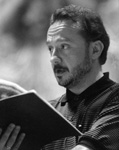 Born in Valencia, where he did a
degree course in singing at the Higher Conservatoire under the
guidance of professor Carmen Martínez, finishing with the highest
marks. As a grant holder of the foundation Fundación Santiago Lope,
sponsored by the provincial council of Valencia, he furthers his
studies with Marius van Altena, Montserrat Figueras, Esperanza Abad
and Bruno Turner.
Born in Valencia, where he did a
degree course in singing at the Higher Conservatoire under the
guidance of professor Carmen Martínez, finishing with the highest
marks. As a grant holder of the foundation Fundación Santiago Lope,
sponsored by the provincial council of Valencia, he furthers his
studies with Marius van Altena, Montserrat Figueras, Esperanza Abad
and Bruno Turner.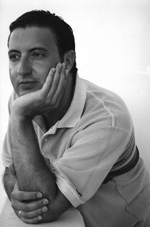 Carlos Mena was born in
Vitoria-Gasteiz (1971), where he studied music at the School of
Music run by Jesús Guridi. He began specializing in the repertoire
for countertenors attending master classes given by Ch. Brett. In
1992 he enters the Schola Cantorum Basiliensis (SCB) in Basle
(Switzerland) to specialize in the repertoire of the renaissance and
baroque period with the help of his teachers, R. Levitt, R. Jacobs,
J. Cash and E. Kirkby.
Carlos Mena was born in
Vitoria-Gasteiz (1971), where he studied music at the School of
Music run by Jesús Guridi. He began specializing in the repertoire
for countertenors attending master classes given by Ch. Brett. In
1992 he enters the Schola Cantorum Basiliensis (SCB) in Basle
(Switzerland) to specialize in the repertoire of the renaissance and
baroque period with the help of his teachers, R. Levitt, R. Jacobs,
J. Cash and E. Kirkby.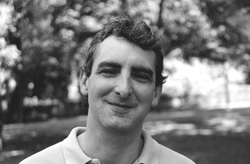 Ignacio Ribas was born in Valencia.
At the Conservatoire of this town he obtains the title of Piano and
Harpsichord Teacher. He starts a degree course in organ playing
under Vicente Ros, finishing his education at the Higher
Conservatoire of Music in Barcelona under the guidance of Montserrat
Torrent.
Ignacio Ribas was born in Valencia.
At the Conservatoire of this town he obtains the title of Piano and
Harpsichord Teacher. He starts a degree course in organ playing
under Vicente Ros, finishing his education at the Higher
Conservatoire of Music in Barcelona under the guidance of Montserrat
Torrent.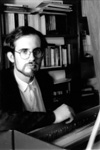 Andrés Cea is an organist who
studied mostly in Spain, and later on took organ lessons from Jean
Boyer at the Lille conservatoire in France and at the Schola
Cantoruma in Basle, Switzerland, studying with professer Jean
Claude-Zehnder. As he took an interest to playing historical
instruments, he also studied the harpsichord and the clavichord and
worked in the area of organ-building, helping with the restoration
of numerous instruments in Spain and France.
Andrés Cea is an organist who
studied mostly in Spain, and later on took organ lessons from Jean
Boyer at the Lille conservatoire in France and at the Schola
Cantoruma in Basle, Switzerland, studying with professer Jean
Claude-Zehnder. As he took an interest to playing historical
instruments, he also studied the harpsichord and the clavichord and
worked in the area of organ-building, helping with the restoration
of numerous instruments in Spain and France.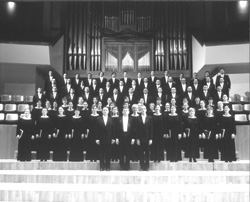 Depending on the Instituto Valenciano
de la Música, this Choral Society made its debut in 1987 under the
name of Coro de Valencia. Their regular choirmaster is Francesc
Perales, with Salvador Moroder as assistant choirmaster, and
Francisco Hervás as accompanist at the piano. They have performed
mainly with the Orquesta de Valencia, at the Palau de la Música, as
well a with a large number of leading Spanish orchestras. At
international level they worked with such ensembles as Virtuosos de
Moscú, la Orquesta de Cámara de Holanda, la Orquesta Barroca de la
Comunidad Europea, Academy of St. Martin-in-the-Fields, the English
Chamber Orchestra, Orchestre du Capitole de Toulouse and the Gustav
Mahler Jugendorchester, and others. They sang being conducted by
Francesc Perales, Claudio Abbado, Antonello Allemandi, Bertrand de
Billy, Franz-Paul Decker, Manuel Galduf, Enrique García Asensio,
García Navarro, Ángel Gil Ordóñez, Miguel Angel Gómez
Martínez, Leopold Hager, Robert King, Sir Neville Marriner, Lord
Yehudi Menuhin, Krzysztof Penderecki, Josep Pons, Michel Plasson,
Georges Prêtre, Helmuth Rilling, David Robertson, Guennadi
Rojdestvenski and Antoni Ros-Marbà. The repertoire of the Choral
Society Cor de la Generalitat Valenciana comprises works from all
periods for symphony orchestra and choir, while they have also taken
part in operatic productions by the Teatro Principal de Valencia,
the Real de Madrid, the Liceo de Barcelona, and many others. They
visited all major European festivals with Tramuntana Tremens, a show
produced by the composer Carles Santos. They sang at the Closing
Ceremony of the '92 Olympics in Barcelona and at the UNESCO
headquarters in París. The have worked with the theatrical ensemble
La Fura dels Baus in staging La Atlàntida by Manuel de Falla and El
martirio de San Sebastián by Claude Debussy, first performed at the
Opera of Rome; they have also participated in Mass, by Leonard
Bernstein, performed in Spain. They have recorded for the Harmonia
Mundi label works by Mompou, Luis de Pablo and Falla, with Josep
Pons at the conductor´s rostrum, and a record with music from the
period of Pope Alexander VI for the Naïve / Auvidis label, along
with the ensemble Capella de Ministrers. Shortly they will
participate in the recording of the complete CD collection of the
works written by Joaquín Rodrigo, produced by EMI.
Depending on the Instituto Valenciano
de la Música, this Choral Society made its debut in 1987 under the
name of Coro de Valencia. Their regular choirmaster is Francesc
Perales, with Salvador Moroder as assistant choirmaster, and
Francisco Hervás as accompanist at the piano. They have performed
mainly with the Orquesta de Valencia, at the Palau de la Música, as
well a with a large number of leading Spanish orchestras. At
international level they worked with such ensembles as Virtuosos de
Moscú, la Orquesta de Cámara de Holanda, la Orquesta Barroca de la
Comunidad Europea, Academy of St. Martin-in-the-Fields, the English
Chamber Orchestra, Orchestre du Capitole de Toulouse and the Gustav
Mahler Jugendorchester, and others. They sang being conducted by
Francesc Perales, Claudio Abbado, Antonello Allemandi, Bertrand de
Billy, Franz-Paul Decker, Manuel Galduf, Enrique García Asensio,
García Navarro, Ángel Gil Ordóñez, Miguel Angel Gómez
Martínez, Leopold Hager, Robert King, Sir Neville Marriner, Lord
Yehudi Menuhin, Krzysztof Penderecki, Josep Pons, Michel Plasson,
Georges Prêtre, Helmuth Rilling, David Robertson, Guennadi
Rojdestvenski and Antoni Ros-Marbà. The repertoire of the Choral
Society Cor de la Generalitat Valenciana comprises works from all
periods for symphony orchestra and choir, while they have also taken
part in operatic productions by the Teatro Principal de Valencia,
the Real de Madrid, the Liceo de Barcelona, and many others. They
visited all major European festivals with Tramuntana Tremens, a show
produced by the composer Carles Santos. They sang at the Closing
Ceremony of the '92 Olympics in Barcelona and at the UNESCO
headquarters in París. The have worked with the theatrical ensemble
La Fura dels Baus in staging La Atlàntida by Manuel de Falla and El
martirio de San Sebastián by Claude Debussy, first performed at the
Opera of Rome; they have also participated in Mass, by Leonard
Bernstein, performed in Spain. They have recorded for the Harmonia
Mundi label works by Mompou, Luis de Pablo and Falla, with Josep
Pons at the conductor´s rostrum, and a record with music from the
period of Pope Alexander VI for the Naïve / Auvidis label, along
with the ensemble Capella de Ministrers. Shortly they will
participate in the recording of the complete CD collection of the
works written by Joaquín Rodrigo, produced by EMI.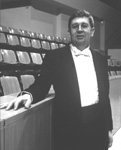 Their incumbent choirmaster, Francesc
Perales, was born in Xàtiva in 1959. He studied music at the Higher
Conservatoire of Valencia where he obtained the title of clarinet
teacher. He studied the art of choir and orchestra conducting with
Eduardo Cifre, José Ferriz and Manuel Galduf and received an
honours award in both specialities. He also attended a course with
Helmuth Rilling. He conducted the National Choir of Spain, the Coro
Nacional de España and the orchestras of Valencia, the Orchestra
Joaquín Rodrigo, the Collegium Instrumentale of the Valencia
Conservatoire and the Valencia Symphonic Orchestra. In addition, he
conducted the Grup Instrumental de València at the festival of
contemporary music, ENSEMS. He assisted Georges Prêtre with the
performance of El Martirio de San Sebastian by Debussy in Cagliaria
and ran a workshop on the choral singing of the Christmas Oratorio
by J.S. Bach as part of the Manuel de Falla Courses in Granada under
the artistic guidance of Helmuth Rilling. As a choirmaster of the
Coro de la Generalitat Valenciana, the Choir of the Valencian
Autonomous Region, whose incumbent conductor he has been since 1988,
he has offered concerts based on the works of Bach, Rossini,
Mendelssohn, Luis de Pablo, Penderecki and of numerous Valencian
composers.
Their incumbent choirmaster, Francesc
Perales, was born in Xàtiva in 1959. He studied music at the Higher
Conservatoire of Valencia where he obtained the title of clarinet
teacher. He studied the art of choir and orchestra conducting with
Eduardo Cifre, José Ferriz and Manuel Galduf and received an
honours award in both specialities. He also attended a course with
Helmuth Rilling. He conducted the National Choir of Spain, the Coro
Nacional de España and the orchestras of Valencia, the Orchestra
Joaquín Rodrigo, the Collegium Instrumentale of the Valencia
Conservatoire and the Valencia Symphonic Orchestra. In addition, he
conducted the Grup Instrumental de València at the festival of
contemporary music, ENSEMS. He assisted Georges Prêtre with the
performance of El Martirio de San Sebastian by Debussy in Cagliaria
and ran a workshop on the choral singing of the Christmas Oratorio
by J.S. Bach as part of the Manuel de Falla Courses in Granada under
the artistic guidance of Helmuth Rilling. As a choirmaster of the
Coro de la Generalitat Valenciana, the Choir of the Valencian
Autonomous Region, whose incumbent conductor he has been since 1988,
he has offered concerts based on the works of Bach, Rossini,
Mendelssohn, Luis de Pablo, Penderecki and of numerous Valencian
composers.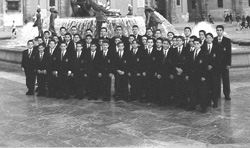 La Escolanía de la Virgen, the
Schola Cantorum of the Virgin Mary, was founded on 7 December,1958
on the initiative of the then Archbishop of Valencia, Monsignor
Marcelino Olaechea. Their voices fill the air in the Real Basílica
de la Virgen at 1 pm every day to celebrate the Eucharist or Holy
Communion.
La Escolanía de la Virgen, the
Schola Cantorum of the Virgin Mary, was founded on 7 December,1958
on the initiative of the then Archbishop of Valencia, Monsignor
Marcelino Olaechea. Their voices fill the air in the Real Basílica
de la Virgen at 1 pm every day to celebrate the Eucharist or Holy
Communion.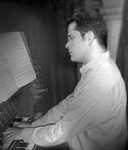 José Benantzi Bilbao is born in
Mundaka, in the Spanish province of Biscay. He studies the piano,
the harpsichord and the organ as well as singing, choir conducting
and ancient music at various conservatoires and specialized colleges
in Spain with professors like Esteban Elizondo, María Folco,
Alberto Blancafort, Loreto Imaz, Gregorio García and Javier Artigas
who give him the highest marks. Later he moves to Basle,
Switzerland, where he studies the art of organ playing with
professor Brett Leighton, and he also completes various postgraduate
and specialization courses under the guidance of professors
Montserrat Torrent, André Isoir, Michael Radulescu and Daniel Roth
and others.
José Benantzi Bilbao is born in
Mundaka, in the Spanish province of Biscay. He studies the piano,
the harpsichord and the organ as well as singing, choir conducting
and ancient music at various conservatoires and specialized colleges
in Spain with professors like Esteban Elizondo, María Folco,
Alberto Blancafort, Loreto Imaz, Gregorio García and Javier Artigas
who give him the highest marks. Later he moves to Basle,
Switzerland, where he studies the art of organ playing with
professor Brett Leighton, and he also completes various postgraduate
and specialization courses under the guidance of professors
Montserrat Torrent, André Isoir, Michael Radulescu and Daniel Roth
and others. Fabio Ciofini completes courses for
organ and piano at the Perugia Conservatoire in Italy with W. Van de
Pol and M.F. Spaventi. He studies the clavicembalo-harpsichord at
the school of music in Fiesole with A. Fedi. Later he continues his
organ studies at the Amsterdam Conservatoire with professor J. Van
Oortmerssen, obtaining the "Postgraduate" diploma in
baroque music in the year 1999. In 1995 he is appointed permanent
organist of the collegiate church Colegiata de Santa María la Mayor
in town of Collescipoli, which is home to an important historical
instrument built by Willelm Hermans in 1678. He gives concerts and
master classes on a regular basis in Italy, Europe and the United
States and is invited to take part in prestigious concerts at the
California State University of Chico (California, USA), Oundle
(Great Britain), Jávea (Spain) and others. Fabio Ciofini also keeps
up an important activity as choirmaster. He has made recordings for
the "Bottega Discantica" label playing the Hermans organ
in Collescipoli and the historical organs in the Umbrian region of
Italy for Anthology Records. At present he is professor at the
"Civico Istituto Musicale A. Onofri" in the town of
Spoleto.
Fabio Ciofini completes courses for
organ and piano at the Perugia Conservatoire in Italy with W. Van de
Pol and M.F. Spaventi. He studies the clavicembalo-harpsichord at
the school of music in Fiesole with A. Fedi. Later he continues his
organ studies at the Amsterdam Conservatoire with professor J. Van
Oortmerssen, obtaining the "Postgraduate" diploma in
baroque music in the year 1999. In 1995 he is appointed permanent
organist of the collegiate church Colegiata de Santa María la Mayor
in town of Collescipoli, which is home to an important historical
instrument built by Willelm Hermans in 1678. He gives concerts and
master classes on a regular basis in Italy, Europe and the United
States and is invited to take part in prestigious concerts at the
California State University of Chico (California, USA), Oundle
(Great Britain), Jávea (Spain) and others. Fabio Ciofini also keeps
up an important activity as choirmaster. He has made recordings for
the "Bottega Discantica" label playing the Hermans organ
in Collescipoli and the historical organs in the Umbrian region of
Italy for Anthology Records. At present he is professor at the
"Civico Istituto Musicale A. Onofri" in the town of
Spoleto.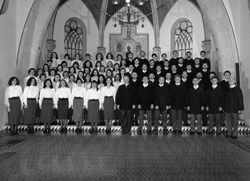 The choir Coro Cabanilles de
Algemesí is a formation of mixed voices with 80 members, with ages
ranging from 16 to 45 years. Their activities consist of
participating in very important liturgical solemnizations at the
Basilica de San Jaime in Algemesí and of following a very intense
concert schedule, both throughout Spain and Europe. They have
participated in various choral meetings and contests, among which
those held at Loreto (Italy), , Llangollen (Wales), First Prize at
the VII International Contest "Villa de Avilés" in 1990
and others stand out. Among the whole repertoire of the Coro
Cabanilles a prominent place is taken by the revival of the
"Danzas al Santísimo Corpus Cristi" in 1979 by the
Valencian composer Joan Bautista Comes, which had not been performed
in its entirety for approximately three hundred years, and by work
focussing on the interpretation of the vocal heritage left by the
composer Cabanilles as well as on the Valencian polyphony. They have
made two sound recordings: "Cuatro Villancicos del Padre
Soler" in the year 1986, and "Obra vocal de
Cabanilles" in 1990. The choir Coro Cabanilles was founded and
is currently conducted by Diego Ramón Lluch.
The choir Coro Cabanilles de
Algemesí is a formation of mixed voices with 80 members, with ages
ranging from 16 to 45 years. Their activities consist of
participating in very important liturgical solemnizations at the
Basilica de San Jaime in Algemesí and of following a very intense
concert schedule, both throughout Spain and Europe. They have
participated in various choral meetings and contests, among which
those held at Loreto (Italy), , Llangollen (Wales), First Prize at
the VII International Contest "Villa de Avilés" in 1990
and others stand out. Among the whole repertoire of the Coro
Cabanilles a prominent place is taken by the revival of the
"Danzas al Santísimo Corpus Cristi" in 1979 by the
Valencian composer Joan Bautista Comes, which had not been performed
in its entirety for approximately three hundred years, and by work
focussing on the interpretation of the vocal heritage left by the
composer Cabanilles as well as on the Valencian polyphony. They have
made two sound recordings: "Cuatro Villancicos del Padre
Soler" in the year 1986, and "Obra vocal de
Cabanilles" in 1990. The choir Coro Cabanilles was founded and
is currently conducted by Diego Ramón Lluch.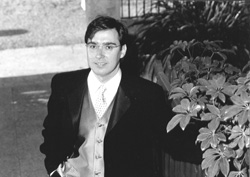 Organist and harpsichord player, born
in Denia in 1970. He begins his organ studies under the auspices of
Dutch professor Rynko Ottes and continues is education at the Higher
Conservatoires for Music at Barcelona and Murcia with professors
Josep Mª Mas i Bonet (organ) and Javier Artigas (harpsichord), and
at the Faculty of Music and Dramatic Arts in Vienna (Austria), with
professor Michael Radulescu (organ) and Karl Östereicher
(conducting).
Organist and harpsichord player, born
in Denia in 1970. He begins his organ studies under the auspices of
Dutch professor Rynko Ottes and continues is education at the Higher
Conservatoires for Music at Barcelona and Murcia with professors
Josep Mª Mas i Bonet (organ) and Javier Artigas (harpsichord), and
at the Faculty of Music and Dramatic Arts in Vienna (Austria), with
professor Michael Radulescu (organ) and Karl Östereicher
(conducting).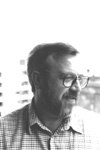 Diego Ramón Lluch was born in
Picassent (Valencia) in 1948. He studied harmony, the piano and
organ at the Higher Conservatoire of Music in Valencia. He obtained
an arts degree from the Pontifical University of Salamanca. In 1971
he founded the Schola Cantorum de Algemesí. During five years he
followed courses on the teaching of music and choir conducting in
Kecskemét, Hungary, under the guidance of professors Péter Erdei,
Ildikó Herboi and Helga Szabo. He teaches choir conducting at the
international courses orgnanized by the choral society Orfeó
Lleidatà. Since 1988 he has been a teacher who collaborates on the
program "Música a l´escola", (= music at schools)
organized by the Valencian ministry of education and science. He has
been an organist and chapelmaster of the Basílica de San Jaime de
Algemesí since 1971.
Diego Ramón Lluch was born in
Picassent (Valencia) in 1948. He studied harmony, the piano and
organ at the Higher Conservatoire of Music in Valencia. He obtained
an arts degree from the Pontifical University of Salamanca. In 1971
he founded the Schola Cantorum de Algemesí. During five years he
followed courses on the teaching of music and choir conducting in
Kecskemét, Hungary, under the guidance of professors Péter Erdei,
Ildikó Herboi and Helga Szabo. He teaches choir conducting at the
international courses orgnanized by the choral society Orfeó
Lleidatà. Since 1988 he has been a teacher who collaborates on the
program "Música a l´escola", (= music at schools)
organized by the Valencian ministry of education and science. He has
been an organist and chapelmaster of the Basílica de San Jaime de
Algemesí since 1971.